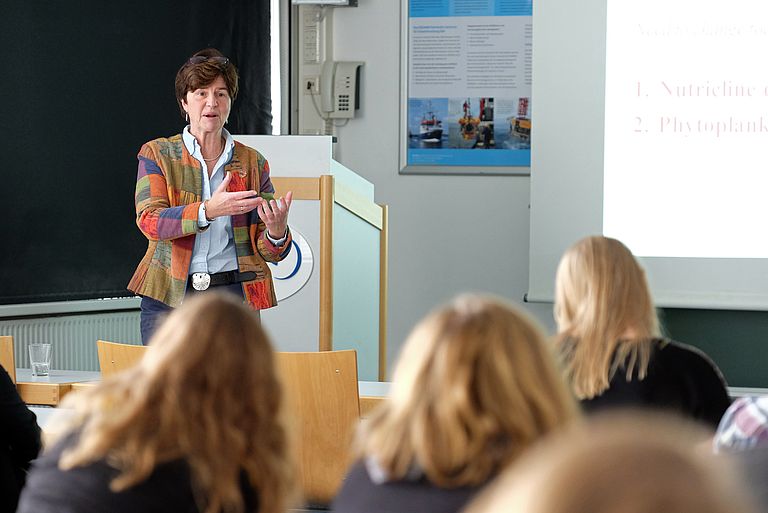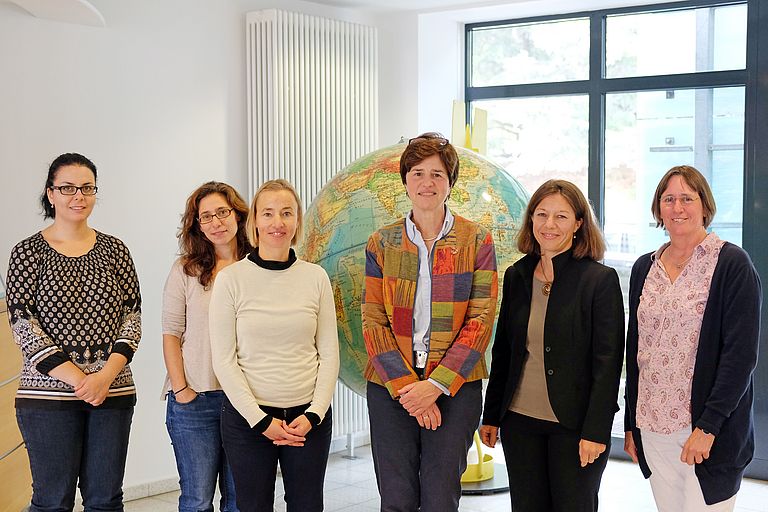Phytoplankton in a warmer ocean
The biological oceanographer, Prof. Dr. Katherine Richardson from the University of Copenhagen, holds Marie Tharp Lecture for Ocean Research at GEOMAR
09.22.2017 / Kiel. Phytoplankton, made up of tiny single-celled organisms in the sea, contributes at least half the global primary production, providing half of the oxygen we need to breathe. Numerous studies indicate that primary production in the sea is changing due to climate change, which would have dramatic consequences for all marine food webs, biogeochemical material flows and ultimately for humans. Reliable estimates of primary production, particularly in connection with global change, are therefore essential.
With the help of many observations and model simulations, scientists are trying to quantify and understand the proportion of global primary production from the oceans. An expert in this area is the US-American biological oceanographer Prof. Dr. Katherine Richardson of the University of Copenhagen. Prof. Richardson presented her latest results at the GEOMAR Helmholtz Center for Ocean Research Kiel in the context of the Marie-Tharp Lecture Series for Ocean Research (MTLS) yesterday.
Prof. Richardson first studied at Harvard University (Massachusetts, USA) and received her PhD at the University of North Wales (UK). She then went to the Umeå University in Sweden, the University of Wales, and the University of Dundee, Scotland, before joining the Danish Institute of Fisheries in Denmark in 1983. She became the head of the Department of Marine and Coastal Ecology in 1988 and became the Scientific Director in 1996. In 1998, Katherine Richardson was appointed professor at the University of Aarhus, where she was the prorector from 2002 to 2007 and the vice dean of the Faculty of Science from 2007 to 2012. Currently, she is a professor of biological oceanography at the University of Copenhagen and head of the Sustainability Science Center there. Throughout her career, she has published over 100 scientific publications and book chapters.
Katherine Richardson also works in important national and international bodies in the field of climate research. She was chair of the Danish Commission on Climate Change Policy, which developed the plan for removing fossil fuels from the Danish energy and transport sector upon which the current Danish energy strategy is based. She is a member of the Danish Council on Climate Change and a member of the United Nations Scientific Panel to draft the Global Sustainable Development Report to be published in 2019.
In her lecture, Prof. Richardson presented an eco-physiological approach to the detection of global primary production, which incorporates macro-ecological patterns of phytoplankton photosynthesis through all layers of the water column. Based on her research to date, Richardson concludes that heating the upper water levels does not necessarily lead to a reduction in primary productivity in the ocean. It also suggested that low-nutrient regions of the ocean are likely to be far more productive than previously thought.
The "Marie Tharp Lecture Series" is organized by GEOMAR's Women's Executive Board (WEB). The WEB invites internationally renowned scientists who present their scientific work in Kiel, but also to serve as a model for young female scientists. As in the past lectures, a get-together took place, only for female scientists, following the public scientific lecture. There, young researchers can exchange with the more experienced colleagues and discuss issues facing them during their careers.
Further informationen and contact:
www.geomar.de/go/web GEOMAR's Women's Executive Board




